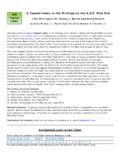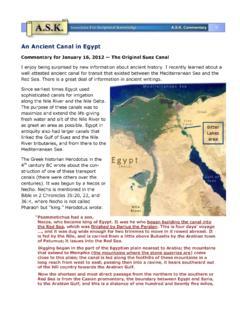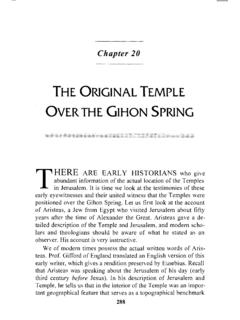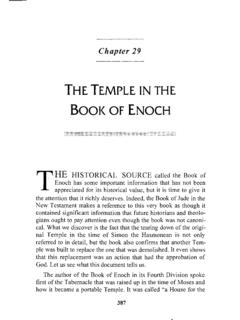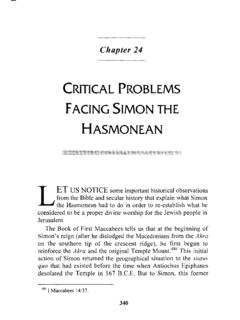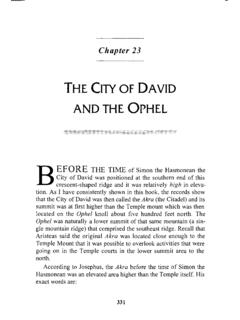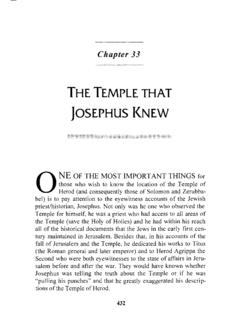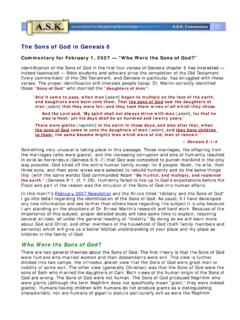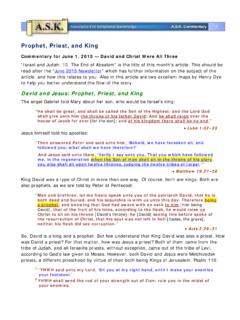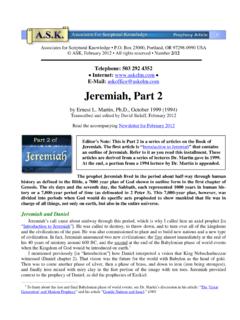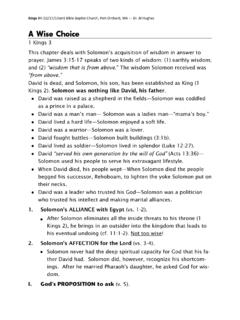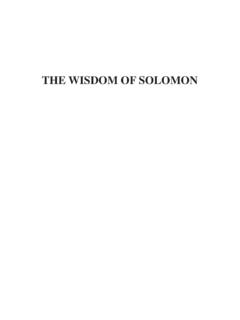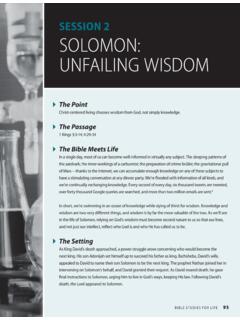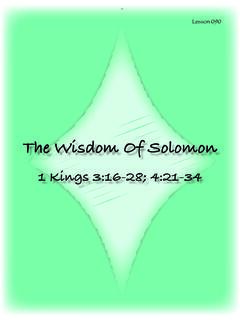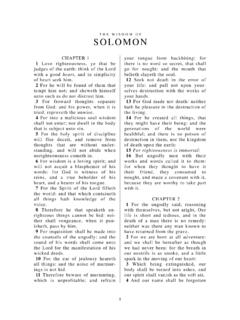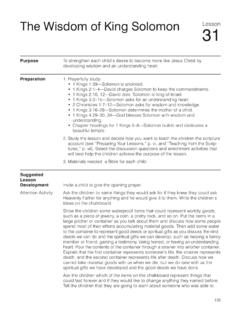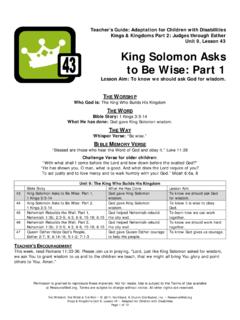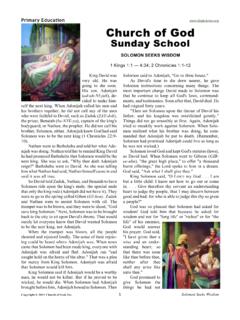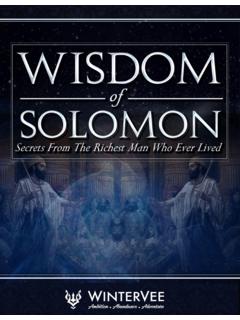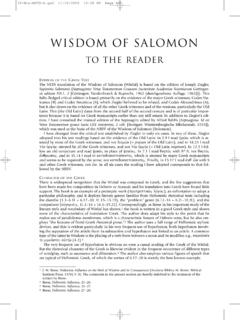Transcription of Israel and Judah: 17. Solomon’s Early Reign - askelm.com
1 Associates for Scriptural Knowledge Box 25000, Portland, OR 97298-0990 USA ASK, April 2016 All rights reserved Number 4/16 Telephone: 503 292 4352 Internet: E-Mail: Israel and Judah: 17. solomon s Early Reign by David Sielaff, April 2016 Read the accompanying Newsletter for April 2016 THE SITUATION: solomon is the sole ruler of the united Kingdom of Israel . solomon inherits much from David a vast empire with kings who owe fidelity to him as their superior, great wealth from David s con-quests, a nation with a growing population and, as we shall read, great celebrity because of his wisdom . He also begins to fulfill the commission given to him from YHWH as told by his father King David. For this we have two accounts, one in First Kings and the other in Second Chronicles, but they parallel each other less than usual. TEXT: The Extent of solomon s Empire 1 Kings 4:20 21 20 Judah and Israel were as numerous as the sand which is on the sea shore for multitude, eating and drinking and rejoicing.
2 21 As for solomon , he came to be the ruler over all the kingdoms from the Stream as far as the land of the Philistines unto the boundary of Egypt; they brought close approach presents and were serving solomon all the days of his life. 2 Chronicles 9:26 26 He came to be ruler over all the kings from the stream unto the land of the Philistines and unto the boundary of Egypt. [end text] Verse 20. The demographics of Judah and Israel are described. Populations can grow quickly during times of prosperity. David s rule of 33 years in Jerusalem of all 12 tribes was prosperous for the people of Israel in spite of two short rebellions by two of David s sons. Eating and drinking and rejoicing was a way of stating these were prosperous times for common peo-ple and that taxes for the King s court and administration were not grievous in times of plenty. 1 Kings 4:21; 2 Chronicles 9:26. These verses tell us the extent of solomon s empire.
3 It went from the 2 Stream, meaning the Euphrates River, to the boundary of Egypt which was the eastern-most tributary of the Nile River. Usually in the Middle East, mountains are boundaries but for David s and solomon s empire the boundaries were rivers. No boundary to the south is mentioned which could have one of two meanings. First, it could mean that the southern boundary was somewhere in the desert of Arabia, south of Palestine. The second meaning could be that the extent of solomon s empire (which he controlled but did not directly rule) included all of the Arabian peninsula. If the second was true, then his area of control was truly vast. It would explain his later interest to develop maritime trade east of the Arabian peninsula to India and even Africa (1 Kings 9:26 28), particularly Ethiopia or Sheba (although its location is uncertain). The kings and kingdoms all sent solomon gifts, which means they sent him tribute as a superior king and acknowledging his superiority over them.
4 They owed him loyalty, obedience, and tribute. The tribute went to solomon personally. TEXT: solomon s Wealth and Power 1 Kings 4:22 28 22 solomon s bread for one day was thirty cors [ measures, KJV] of flour and sixty cors of meal [flour], 23 ten plump oxen and twenty grazed oxen, a hundred of the flock, besides deer and gazelle, bubale and fattened fowl. 24 He was holding sway in all the land this side of the Stream, from Tiphsah as far as Gaza, over all the kings this side of the Stream; and peace came to him from all his sides round about. 25 Judah and Israel dwelt in serenity, each man under his vine and under his fig tree, from Dan unto Beer-sheba, all the days of solomon . 26 solomon came to have 4,000 stalls of horses for his chariots and 12,000 steeds [horses to be ridden]. 27 Those deputies provided for king solomon and all who came near to king solomon s table, each in his month; they let nothing be lacking.
5 28 They also brought, each as his due, barley and crushed straw for the horses and stallions to wherever the place might be. [end text] Verses 22 23. These daily provisions for solomon s palace are an indicator about the size of his admin-istration and government. Verse 24. The extent of solomon s empire is repeated, but with additional details. It seems the Philistine lands were not part of his direct control, and that Israel was at peace from all his sides round about. Verse 26. For 4,000 stalls of horses, s ee 1 Kings 10:26 and 2 Chronicles 9: 25 where these numbers are repeated. Most Hebrew manuscripts have 40,000 as the number of stalls, and the Greek Septuagint has the number as 40,000, but they are said to be brood mares. While most commentators state that the horses were used for cavalry or chariot units, I am not so sure. Many of the horses were likely used for communica-tion as an Early royal mail system in times of peace.
6 Verse 27. The deputies are presented in 1 Kings 4:7 19, and mention of them continues in verse 22. solomon had twelve deputies over all of Israel . They provided for the king and his household; it rested on each one to provide them with food for one month in the year. 1 Kings 4:7 The deputies responsibility was to oversee delivery of provisions for King solomon and his court. This year-round assignment was apportioned to each deputy in their regions of responsibility. Their areas coordinate somewhat with the boundaries of the tribes of Israel . It is likely that special provisions for the spring and fall feasts were provided from all twelve deputies, particularly once the Temple construction was completed. These provisions were for the king and his court and administrators only. Other provisions were made for the many thousands involved in the actual construction of the Temple and solomon s new palace. 3 TEXT: solomon s Reputation for wisdom 1 Kings 4:29 34 29 Elohim gave solomon wisdom , exceedingly much understanding and wideness of heart, [1] like the sand which is on the sea shore.
7 30 the wisdom of solomon was [2] greater than the wisdom of all the sons of the east, and [3] all the wisdom of Egypt. 31 He was wiser than any other human, [4] wiser than Ethan the Ezrahite and Heman and Calcol and Darda the sons of Mahol. So his name became famous in all the nations round about. 32 He composed 3,000 proverbs, and his songs came to be 5,000 [1,005].a 33 He spoke about the trees, from the cedar of the Lebanon unto the hyssop which is coming forth in the sidewall. He spoke about the beast and the flyer, about the reptile and the fish. 34 They came from all the peoples to hear the wisdom of solomon , and he took approach presents from all the kings of the earth who had heard of his wisdom . [end text] Verse 29 31. Imagine, having wisdom given to you from God Himself, as well as a wideness of heart, which meant that solomon had comprehensive knowledge. In other words he knew much about a variety of subjects.
8 solomon studied deeply and learned useful information about a wide range of subjects. He did so systematically. Four comparisons of the wisdom of solomon are made to other people. Note this additional information in verse 30: Ethan, Heman, Calcol and Darda were the sons of Zerah (1 Chr 2:6). Heman and Ethan authored Pss 88 89, two of the wisdom psalms. The term Ezrahite which is applied to Ethan in 1 Kgs 4:31 and to both Ethan and Heman in the psalm titles is probably a variation of the family name Zerah. The Levites Ethan and Heman of 1 Chr 6:33, 44 who were singers appoint-ed by David may be the same men mentioned here. If this is the case, then these Levites, by virtue of their residence, would have been incorporated into the Judahite family of Zerah. 1 Kgs 4:29 34, in Smith, The Books of Historyb Verses 30 31. The regions of the east and Egypt southwest of Israel are cited for being places where wisdom was honored and studied.
9 Now a new individual was renowned for his wisdom : solomon of Israel , a land at the crossroads of Europe, Asia, and Africa. Four well known individuals are specifically named and are said to be inferior to solomon in wisdom . Verse 31. Jesus specifically stated he was greater than solomon (Matthew 12:42; Luke 11:31), and this refers to wisdom . That is quite a statement by our Lord! Verse 32. The Greek Septuagint translation has that solomon wrote 5,000 songs. King James Version and most English translations have that solomon wrote 1,005 songs. This number is in accord with the Hebrew Masoretic text and I believe the 1,005 number is most likely to be accurate. Verse 33. solomon spoke about his studies in botany and zoology. His research likely involved observation, classification, dissection, and probably breeding. Verse 34. The phrase they came from all the peoples (peoples, plural) refers to people of wisdom who came from all over the region.
10 The word is not nations but peoples. Egypt and the east are specifically mentioned. Not only did people of wisdom come to interact and learn from solomon , but foreign kings came also to visit solomon as we find in later verses. Only a confident ruler of a stable kingdom would dare a It is also clear that solomon organized observations from several locations to conduct what we today would call research. Dr. Ernest Martin unpacks and explains the scope of solomon s wisdom in his fascinating article The Bible and Scientific Mysteries, Part 1. b James E. Smith, The Books of History, Old Testament Survey Series (Joplin, MO: College Press, 1995), 1 Kings 4:29 34. 4 leave the lands he ruled to visit another king or realm. Apparently it was very important for them to risk rebellion by leaving their kingdom, just to spend time with solomon and learn from his wisdom .
